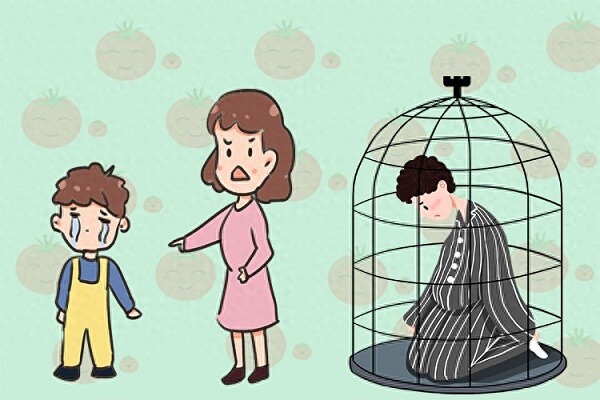A mother’s love, patience, and lessons shape her child’s character and mindset, laying the foundation for their future success. Every moment spent with mom contributes to building a strong future for the child, instilling values, life principles, and resilience to face life’s challenges.
Thus, a mother’s role goes beyond physical nurturing; it involves nourishing her child’s soul and intellect, profoundly influencing their journey toward adulthood. During this formative process, mothers should avoid making these four critical mistakes.


The Complaining Mother: Struggling to Raise a Happy Child
Observe the children with bright futures and success; they are confident, cheerful, hardworking, and filial. They are often raised in a positive environment where love and encouragement prevail.
However, when a mother resorts to scolding or denying her child’s abilities with statements like, “You can’t do this,” or “You are good for nothing,” the child subconsciously develops in the direction the mother has emphasized. Children raised in such an environment tend to lack confidence, feel discouraged, and complain more easily.
On the contrary, a mother who encourages and motivates her child can help them progress from average abilities to remarkable achievements. Sincere praise, support during challenging times, and lessons from failures equip children with essential skills to face adversity.

The Complaining Mother: Struggling to Raise a Happy Child.

The Self-Sacrificing Mother: Challenges in Raising a Grateful Child
Self-sacrifice is often seen as a virtue among Vietnamese women. Traditionally, mothers have been symbols of self-sacrifice, endurance, and willingness to give up their happiness for their children’s future.
Mothers endure hardships and always put their children first, from ensuring their meals and sleep to teaching and caring for them in their daily lives.

The Self-Sacrificing Mother: Challenges in Raising a Grateful Child.
However, mothers don’t always need to sacrifice everything for their children. Extreme self-sacrifice can lead to children not understanding the value of gratitude and even feeling burdened by their mother’s control and pressure. This may result in dependent, less self-reliant children who struggle with problem-solving.
Moreover, if the child constantly rebels, the parent-child relationship becomes strained, making it challenging for the child to comprehend the mother’s sacrifices. The pressure to meet parental expectations can also induce anxiety and stress.
Therefore, it’s crucial for mothers to strike a balance between self-sacrifice and child-rearing. Encourage your children to develop self-reliance, confidence, and a sense of responsibility for their actions.

The Critical Mother: Hindering the Development of a Confident Child
In “Little Joy,” the single mother, Song Xian, is a typical example. She is extremely strict with her daughter, Ang Zi, constantly emphasizing the importance of hard work. What bothers Ang Zi the most is her mother’s constant nagging.
Once, Ang Zi participated in a competition and came in second place. Instead of congratulating her, Song Xian said, “What’s there to be happy about when you only got second place?”
Song Xian also restricts her daughter’s pursuit of her hobbies. She breaks her daughter’s Lego model and cancels her camping trip with friends. When Ang Zi applies to a university far from home, her mother angrily asks, “Do you want to take this opportunity to get away from me and stop me from managing you?”

The Critical Mother: Hindering the Development of a Confident Child.
Under prolonged pressure, Ang Zi often feels emotionally overwhelmed and becomes increasingly insecure. She starts doubting her talent and passion for astronomy, believing that her hobby is wrong.
Ang Zi begins to experience insomnia and loss of appetite. She fears social interaction, loses confidence, and becomes depressed.
In reality, many parents use this critical approach to educate their children. As a result, children become insecure, discouraged, and mentally unhealthy due to various pressures.

The Grade-Obsessed Mother: Failing to Teach Healthy Money-Making Skills
When mothers overly focus on academic performance, they may unintentionally create immense pressure, leading their children to believe that high scores are the only measure of success, neglecting the importance of practical knowledge and life skills for future success.
By concentrating solely on grades, children may lack creativity and independent thinking, which are vital in today’s work environment. They become dependent on others’ expectations instead of daring to explore their capabilities and interests.
If mothers fail to encourage the development of soft skills such as communication, teamwork, and problem-solving, their children will struggle to adapt to life’s challenges.

By overly focusing on academic performance, mothers may unintentionally create immense pressure.
Furthermore, if mothers neglect to teach their children about money management and financial literacy, and fail to encourage their participation in practical activities, these children will lack the knowledge and experience necessary for independence in the future.
A skillful mother will emphasize applying knowledge to real-life situations, building relationships, and developing a business mindset.
Therefore, a balanced approach is essential—mothers should care about their children’s academic performance while also encouraging self-discovery, practical skill development, and dream cultivation. Only then will children grow into confident and successful individuals in both their studies and future careers.

































